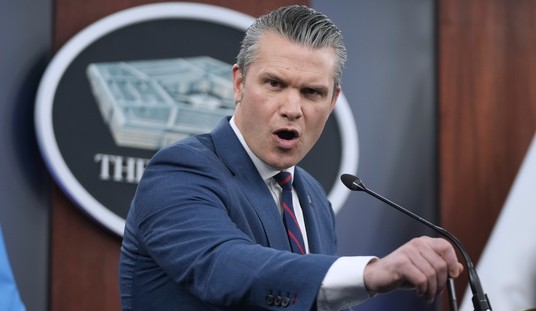Good work by Tapper to try to get to the bottom of this. Ed’s been covering this beat, not me, so I’m behind the curve on the specifics, but read the excerpt and let’s see if we can untangle this.
Lending significant credence to Obama’s response [to the charges that he tried to interfere with negotiations] is the fact that — though it’s absent from the Post story and other retellings — in addition to Obama and Iraqi Prime Minister Nouri al-Maliki, this July meeting was also attended by Bush administration officials such as U.S. Ambassador to Iraq Ryan Crocker and the Baghdad embassy’s Legislative Affairs advisor Rich Haughton, as well as a Republican senator, Chuck Hagel of Nebraska…
A Bush administration official with knowledge of the meeting says that during the meeting Obama stressed to Maliki that he would not interfere with President Bush’s negotiations concerning the US troop presence in Iraq, and that he supports the Bush administration’s position on the need to negotiate as soon as possible the Status of Forces Agreement, which deals with among other matters US troops having immunity from local prosecution.
Obama did assert at the meeting with the Iraqis that he agrees with those – including Hagel and Sen. Richard Lugar, R-Ind., the ranking Republican on the Senate Foreign Relations Committee — who advocate congressional review of the Strategic Framework Agreement being worked out between the Bush administration and the Iraqi government, including the Iraqi parliament…
It’s possible, Obama advisers believe, that either Zebari or columnist Taheri confused the Strategic Framework Agreement, which Obama feels should be reviewed by Congress, with the Status of Forces Agreement, which Obama says the Bush administration should negotiate with the Iraqis as soon as possible.
Two officials of the Bush administration say that if Obama had done what the Post story asserted – which they believe to be untrue – U.S. Ambassador Crocker and embassy officials attending the meeting would have ensured that the Bush administration heard about it immediately. If such an incident occurred in front of officials of the Bush administration, it would have constituted a foreign policy breach and would have been front-page huge news; it would not have leaked out two months later in an op-ed column.
See this WaPo story from April about the difference between the Status of Forces Agreement and the Strategic Framework Agreement. The SOFA deals with military matters like withdrawal; it’s executive branch territory per the president’s role as C-in-C, which means if a legislator like Obama meddles we have ourselves a violation of separation of powers. The SFA is more ambiguous, touching on “cooperation in the political, economic, cultural and security fields” with an eye to long-term relations between the country. That’s more like a treaty, which the president can negotiate but which the Senate gets to approve per its right of advise and consent. Obama’s camp is insisting, and the Bushies who were there seem to agree, that he kept his mitts off the SOFA — no calls for delay or anything else regarding troops levels — while emphasizing that the Senate wants a look at the SFA before the agreement is finally ratified. Why he felt the need to stress that latter point with Maliki and Zebari isn’t immediately clear to me, though, unless he was hinting that they should bear in mind that whatever deal they reach with the Bush administration will have to satisfy Democrats too and that they should therefore calibrate their negotiations accordingly.
Which prompts the question: How far does the Senate’s power of “advise and consent” reach? I’ve always understood the treaty process to exist in two stages, the first of which happens exclusively between the president and the foreign power in negotiating the terms and the second of which happens between the president and the Senate in wrangling over ratification. If the Senate wants to add or subtract terms, they let the president know and then it’s up to him to go back to the foreign power and rework the deal. Obama’s cutting out the constitutional middleman here and going directly to the foreign power himself, which isn’t necessarily a major breach (the Iraqis surely already know the Democrats want a say in the SFA) but which, coming from a guy who might be president in six months, is bound to be taken by Maliki et al. as a heavy hint that they should be thinking less about how to please Bush in their negotiations and more about how to please The One and his deep blue Congress. Which does undermine Bush’s executive authority.
Or am I simply wrong about the Senate’s advise and consent power and Obama was well within his rights to be chatting with Bush’s negotiating partner about a treaty in the works? Fill me in, constitutional scholars. First, though, here’s a special treat for you from June of this year. It’s a long clip but you only have to watch the first two minutes, paying special attention at around 1:30. Exit question: If The One is so scrupulously observant of presidential prerogative, what’s he doing here claiming that the SOFA has to be approved by Congress?








Join the conversation as a VIP Member